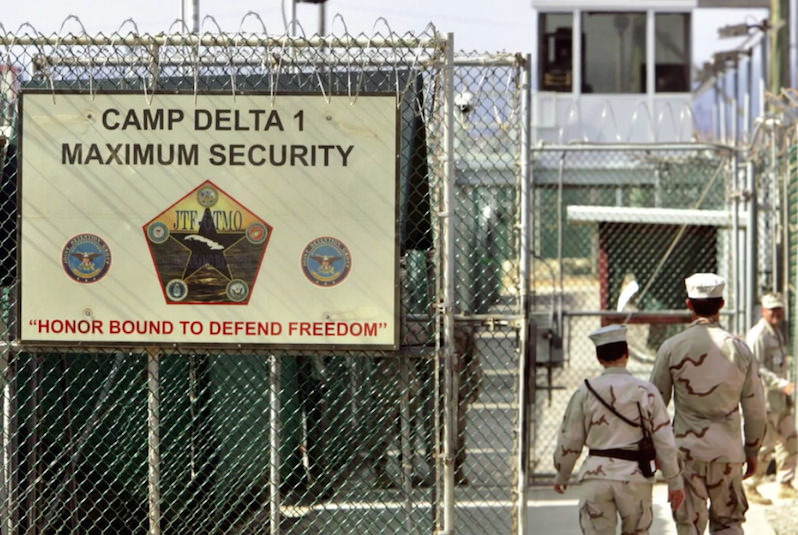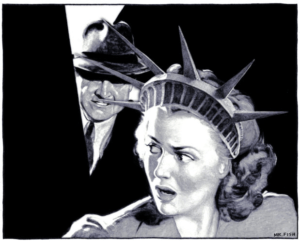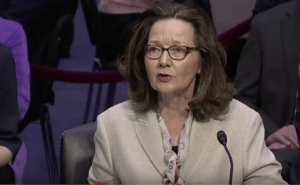Justice Department Turns to a Rarely Used Rule in Trying to Prevent CIA Testimony in Torture Lawsuit
The Trump administration invokes "the state secret privilege" to keep intelligence officials from revealing interrogation techniques.
Camp Delta, a CIA detention facility at Guantanamo Bay, Cuba. (Screen shot via The Washington Post)
The Trump administration is invoking a rarely used legal rule called the state secret privilege to keep Central Intelligence Agency officials from testifying in a federal lawsuit about the CIA’s interrogation methods.
The state secret privilege allows the government to withhold evidence from legal proceedings on the basis that the sensitive evidence would put national security at risk.
The lawsuit was filed in 2015 by two former detainees at C.I.A. secret prisons overseas and the representative of a third man who died in custody. If they prevail in the suit against the former military psychologists, James E. Mitchell and Bruce Jessen, who helped devise and run the interrogation program, it would be the first time an American civilian court has held anyone accountable for a role in developing counterterrorism policies after the Sept. 11, 2001, attacks.
The two former prisoners say they suffered lasting harm from their treatment at C.I.A. “black sites,” secret interrogation and detention centers that it operated overseas. Suleiman Abdullah Salim, a Tanzanian who may have been a victim of mistaken identity, was held in a darkened C.I.A. prison in Afghanistan and subjected to beatings, hanging in chains, sleep deprivation, and water dousing, which involves pouring ice water over detainees to create a sensation of drowning, according to a Senate report and interviews with him.
Mohamed Ahmed Ben Soud, a Libyan also held in Afghanistan, who was likewise mentioned in the Senate report, described being slammed against a wall, shackled to the ceiling, locked in wooden boxes and also subjected to the ice water treatment. The third man, an Afghan named Gul Rahman, died in 2002 in a secret C.I.A. prison in Afghanistan after being left nearly naked and shackled to a wall in the cold.
The Times adds that the Obama administration did not invoke the state secrets privilege rule, but it was not opposed to doing so in the future.
President Trump incited controversy shortly after he took office when reports surfaced that he was considering reopening the CIA “black sites.” However, strong bipartisan opposition seems to have quelled that move.
One of the CIA officials whose testimony is sought in the lawsuit is Gina Haspel, the agency’s new deputy director. Haspel, who has worked for the CIA for decades, previously oversaw the torture of terrorism suspects and worked to destroy evidence of those interrogations.
Haspel was issued a subpoena last December. “After the C.I.A. announced on Feb. 2 that Ms. Haspel was President Trump’s choice as the agency’s deputy director, a lawyer for Dr. Mitchell and Dr. Jessen reminded the government of the subpoenas,” the Times continues. “The defendants said in their filings that Ms. Haspel, who ran one of the C.I.A.’s secret detention sites, was ‘centrally involved in the events alleged’ by the plaintiffs.”
The federal District Court judge in the case must now decide “whether the state secrets privilege and other privileges claimed by the government were properly invoked to block that testimony and, if so, whether the case can go forward despite those restrictions,” the Times concludes.
Read the full report here.
—Posted by Emma Niles
Independent journalism is under threat and overshadowed by heavily funded mainstream media.
You can help level the playing field. Become a member.
Your tax-deductible contribution keeps us digging beneath the headlines to give you thought-provoking, investigative reporting and analysis that unearths what's really happening- without compromise.
Give today to support our courageous, independent journalists.






You need to be a supporter to comment.
There are currently no responses to this article.
Be the first to respond.